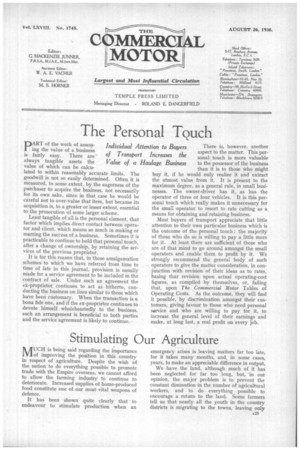The Personal Touch
Page 27

If you've noticed an error in this article please click here to report it so we can fix it.
DART of the work of assess]. ing the value of a business is fairly easy. There are always tangible assets the value of which can be calculated to within reasonably accurate limits. The goodwill is not so easily determined. Often it is measured, to some extent, by the eagerness of the purchaser to acquire the business, not necessarily for its own sake, since in that case he would be careful not to over-value that item, but because its acquisition is, to a greater or lesser extent, essential to the prosecution of some larger scheme. Least tangible of all is the personal element, that factor which implies direct contact between operator and client, which means so much in making or marring the success of a business. Sometimes it is practicable to continue to hold that personal torich, after a change of ownership, by retaining the services of the previous proprietor.
It is for this reason that, in those amalgamation schemes to which we have referred from time to time of late in this journal, provision is usually made for a service agreement to be included in the contract of sale. Under such an agreement the ex-proprietor continues to act as hitherto, conducting the business on lines similar to those which have been customary. When the transaction is a. bona fide one, and if the ex-proprietor continues to devote himself wholeheartedly to the business, such an arrangement is beneficial to both parties and the service agreement is likely to continue. There is, however, another aspect to the matter. This personal touch is more valuable to the possessor of the business than it is to those who might buy it, if he would only realize it and extract the utmost value from it. It is present to the maximum degree, as a general rule, in small businesses. The owner-driver has it, as has the operator of three or four vehicles. It is this personal touch which really makes it unnecessary for the small operator to resort to rate cutting as a means for obtaining and retaining business.
Most buyers of transport appreciate that little attention to their own particular business which is the outcome of the personal touch : the majority of those who do so is willing to pay a little more for it. At least there are sufficient of those who are of that mind to go around amongst the small operators and enable them to profit by it. We strongly recommend the general body of such operators to give the matter consideration, in conjunction with revision of their ideas as to rates, basing that revision upon actual operating-cost figures, as compiled by themselves, or, failing that, upon The Commercial Motor Tables of Operating Costs. As the outcome, they will find it possible, by discrimination amongst their customers, giving favour to those who need personal service and who are willing to pay for it, to increase the general level of their earnings and make, at long last, a real profit on every job.




















































































